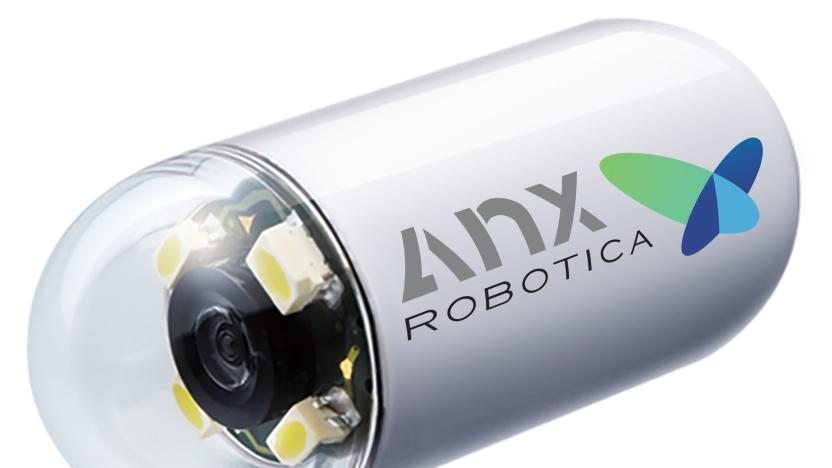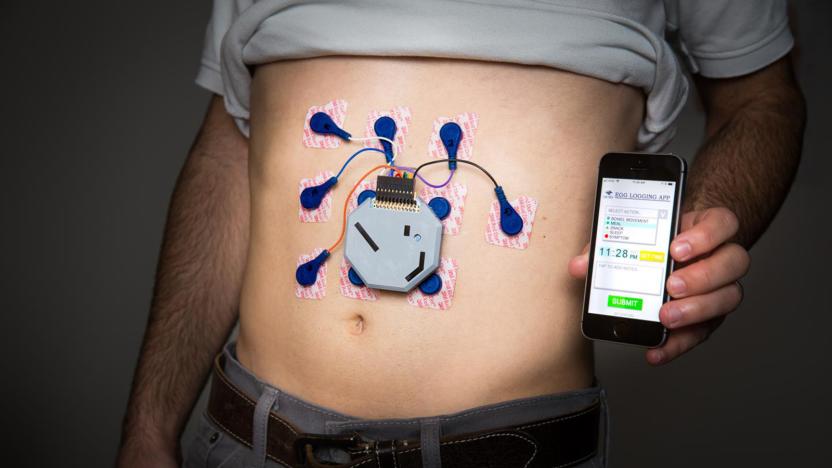stomach
Latest

Scientists develop remote-controlled pill-shaped camera to diagnose digestive issues
Ingestible video capsule endoscopes have been around for a while, but they’re severely limited and not controllable by physicians, relying entirely on the digestive system for movement. Researchers may have just gotten around that limitation by developing a pill-shaped capsule that allows for remote control, as announced by the GW School of Medicine & Health Sciences.

Stomach wearable could replace the need for invasive probes
Researchers have created a wearable monitor that can track your stomach's electrical activity for signs of digestion maladies. Called electrogastrography (EGG), it's like an EEG for the GI tract, and was used briefly in the '90s but abandoned due to a lack of usefulness as a diagnostic tool. UC San Diego scientists are trying to resuscitate it with improved hardware and, most importantly, algorithms that help filter out noise. The results so far are promising, and if perfected, it could help doctors diagnose gastro-intestinal problems without the need for invasive probes or even a hospital visit.

Recommended Reading: Trust your gut
Is Your Gut Microbiome the Key to Health and Happiness? Amy Fleming, The Guardian You've likely heard the phrase "trust your gut" at some point in your life, but the key to being healthy and happy could actually lie in all of those organisms in your digestive system. The Guardian lays out the case for how influential your gut really is and discusses the act of "poop doping." Yes, that's a thing.

Appetite 'pacemaker' tells you when you're actually hungry
For some, the biggest challenge of reaching a healthy weight isn't adjusting their diet or getting more exercise -- it's resisting pangs of hunger when they've already eaten enough. They might have a better time resisting that urge after today, as the US Food and Drug Administration has approved a first-of-its-kind appetite controlling device, EnteroMedics' Maestro Rechargeable System. Think of it as a pacemaker for your stomach. The device sits just under your abdomen and sends electrical pulses that both block hunger signals and send fullness signals more often. In theory, you'll lose weight simply because you have a better sense of when to stop.

Scientists build logic gates out of gut bacteria, then hopefully wash their hands
Ever thought about upgrading your PC by breeding more cores? Or planting a few GBs of extra storage out in the yard? Us neither, until we heard that scientists at Imperial College in London have succeeded in building "some of the basic components of digital devices" out of genetically modified E.Coli. We've seen these germs exploited in a similar way before, but Imperial's researchers claim they're the first to make bacterial logic gates that can be fitted together to form more complex gates and potentially whole biological processors. Aside from our strange upgrade fantasies, such processors could one day be implanted into living bodies -- to weed out cancer cells, clean arteries and deliver medication exactly where it's needed. So much for Activia.

Mastiff digests Major League Eating game license
It's difficult to decide if we're more intrigued or disgusted with publisher Mastiff's announcement that it has gobbled up the license to release games based on "gurgitory" competition organization Major League Eating. While we still have no idea what platforms, or frankly what audiences Mastiff is targeting, the publisher says that Major League Eating: The Game will play "like a fighting game," as players "show brilliant on-screen eating; a mastery of offensive and defensive weapons including burps, belches, and mustard gas; and of course the technical mastery necessary to avoid emptying one's stomach in a vividly colored reversal of fortune." Honestly, we can't make this stuff up.Truth be told, it's difficult to imagine exactly how these games will pan out, though Mastiff has not yet responded to our inquiry as to whether or not the stomach-centric gameplay will be easier to swallow when soaked in water.

UK researchers build artificial stomach, antacid software coming soon
Think you have an iron stomach? British scientists at the Institute of Food Research built one that won't get indigestion from that triple-patty chili cheeseburger you had for lunch. IFR's artificial stomach simulates human digestion, and is made of "sophisticated plastics and metals" to endure all the natural chemicals and enzymes an actual stomach has. According to the BBC, chief designer Dr. Martin Wickham claims that his design improves on previous models (models? plural?) as it actually simulates contractions the stomach uses to process food. But why build such a model, unless you're a big stomach nerd scientist type? It turns out that the stomach's processes are still something of a mystery, and that these researchers would like to be able to develop healthier foods that can "manipulate the digestive process," or as we'd prefer, "hack the digestive process." Now, while the artificial stomach does have the ability to throw up (we're not really sure how that's triggered), we do hope that those boffins are standing well back when they run that particular experiment.[Via Spluch]Read - BBCRead - The Associated Press

Mucus-riding robot headed to intestines
While the thought of having anything, much less a robot, crawl around and inspect our intestinal tract is certainly not in the forefront of our minds, Dimitra Dodou from Delft University of Technology in the Netherlands hopes her ideas will change the way colonoscopies are performed. Currently, uncomfortably large tubes or devices known as "wormbots" crawl through the delicate linings of your intestines, typically causing a great deal of discomfort in the process. Dodou's prototype contains a "polymer material" that clings to proteins found in the mucus lining of the gut, but can have its "sticky properties temporarily turned off" when sprayed with water. This two-faced material can be used in "snail-like" transporters that move by alternately gliding forward when it releases water, "sticking around" to control direction, and repeating again until the final destination is reached. By the close of 2006, Dodou hopes to have a camera-equipped version available for trial, which could be quite helpful in taking biopsies. Although we certainly don't intend on going under the knife anytime soon, it's quite comforting to know that Dodou's mucus-riding robot should makes things easier to stomach (ahem) if the occasion arises.





